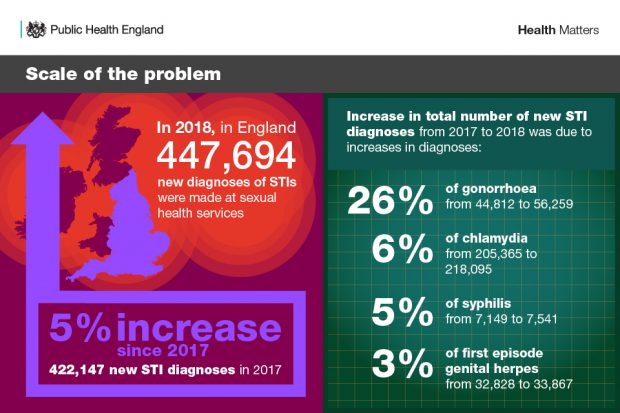
Today is World Sexual Health Day. Public Health England (PHE) supports sexual health commissioning, runs sexual health campaigns and promotes condom use and increased testing.
New PHE data revealed there were around 448,000 cases of sexually transmitted infections (STIs) diagnosed in 2018, an increase of 5% from 2017.
PHE STI and Infectious Diseases in Pregnancy Screening (IDPS) teams are working together to raise awareness among health professionals on promoting reproductive and sexual health, both in the general population and particularly pregnant women.
Find out more about PHE's role in preventing sexually transmitted infections.
Action on sexual health
PHE has published a Syphilis Action Plan, which to help reduce the effect of syphilis on the main affected populations, brings together existing evidence, national guidelines and best practice.
A recent PHE review of congenital syphilis (CS) cases found that health professionals didn’t always recognise symptoms of STIs.
In some cases, they did not refer women appropriately to specialist colleagues in genitourinary medicine (GUM) for timely treatment to reduce the infection being passed onto the unborn baby.
Putting the plan into action
The PHE Syphilis Action Plan has a maternity strand that over the next 2 to 3 years aims to address this important issue through:
- education — launch of the IDPS eLearning package including an advanced module on syphilis
- surveillance — the new IDPS Integrated Screening Outcomes Surveillance Service (ISOSS), national reporting of suspected cases of CS and monitoring of all maternal syphilis infections from April 2020
- health promotion — regional workshops for screening coordinators with input from sexual health specialists
- guidance — new patient information leaflets and updated screening and laboratory handbooks
- evidence and research — the UK National Screening Committee (UK NSC) is conducting a review on the evidence base for retesting for syphilis in the latter stages of pregnancy
Drawing on experience
Sexual health is particularly important for pregnant women as the passing on of syphilis to the baby in pregnancy can cause multiple problems in the pregnancy and affect the future health of the baby.
When I was a community midwife, we traditionally only discussed sexual health during the post-natal period with women, with the focus mainly on family planning.
We need to empower women to report any contributing factors that may affect their sexual health during pregnancy. This includes a change of sexual partner, IV drug use or bisexual partners, or anything unusual with their bodies to ensure early detection and treatment of infections.
We, as healthcare professionals need to be comfortable discussing sexual health with woman and their partners. We also need to be aware of when to recommend and re-offer testing and refer them appropriately to our specialist colleagues. So, everyone...let's talk about sex.
For further information on sexual health topics, visit the NHS website.
PHE Screening blogs
PHE Screening blogs provide up to date news from all NHS screening programmes. You can register to receive updates direct to your inbox, so there’s no need to keep checking for new blogs. If you have any questions about this blog article, or about population screening in England, please contact the PHE screening helpdesk.